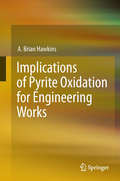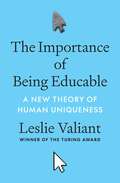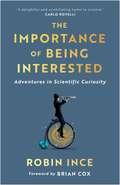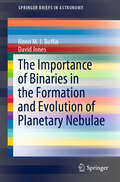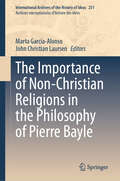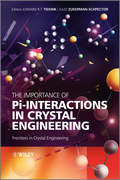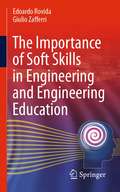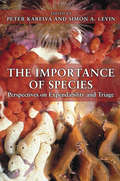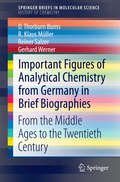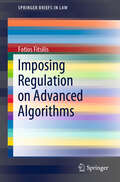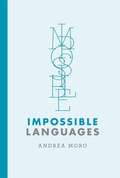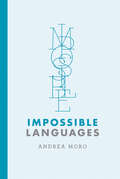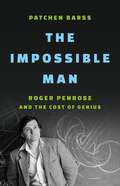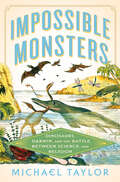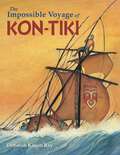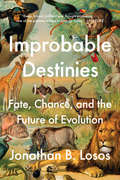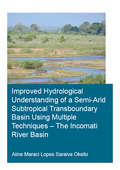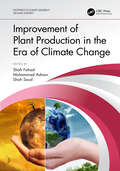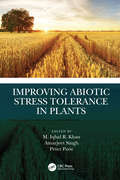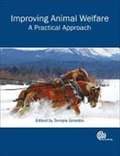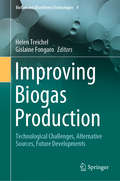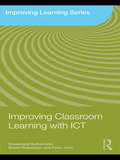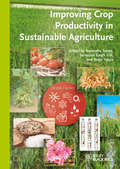- Table View
- List View
Implications of Pyrite Oxidation for Engineering Works
by A. Brian HawkinsThe book highlights and analyses the distress to buildings caused by sulphate-induced heave, with particular reference to the recent problems in the Dublin area of Ireland. It describes the formation of pyrite, the processes involved in its oxidation and the various ways in which consequential expansion takes place. For the first time in the literature it discusses the way that buildings can be raised above their supporting foundation walls by the expansion of pyritiferous fill which has been used beneath ground-bearing floor slabs in Ireland. The significance of fractures through the iron sulphide microcrystals for the rate and extent of oxidation is discussed. Photographs and profiles of sulphate ingress into concrete/concrete blocks are presented. Case histories from the UK, North America and Ireland are discussed.
The Importance of Being Educable: A New Theory of Human Uniqueness
by Leslie ValiantIn the age of AI, why our future depends on better understanding what makes us humanWe are at a crossroads in history. If we hope to share our planet successfully with one another and the AI systems we are creating, we must reflect on who we are, how we got here, and where we are heading. The Importance of Being Educable puts forward a provocative new exploration of the extraordinary facility of humans to absorb and apply knowledge. The remarkable &“educability&” of the human brain can be understood as an information processing ability. It sets our species apart, enables the civilization we have, and gives us the power and potential to set our planet on a steady course. Yet it comes hand in hand with an insidious weakness. While we can readily absorb entire systems of thought about worlds of experience beyond our own, we struggle to judge correctly what information we should trust.In this visionary book, Leslie Valiant argues that understanding the nature of our own educability is crucial to safeguarding our future. After breaking down how we process information to learn and apply knowledge, and drawing comparisons with other animals and AI systems, he explains why education should be humankind&’s central preoccupation.Will the unique capability that has been so foundational to our achievements and civilization continue to drive our progress, or will we fall victim to our vulnerabilities? If we want to play to our species&’ great strength and protect our collective future, we must better understand and prioritize the vital importance of being educable. This book provides a road map.
The Importance of Being Interested: Adventures in Scientific Curiosity
by Robin Ince"A delightful and scintillating hymn to science." —Carlo Rovelli Comedian Robin Ince quickly abandoned science at school, bored by a fog of dull lessons and intimidated by the barrage of equations. But, twenty years later, he fell in love and he now presents one of the world's most popular science podcasts. Every year he meets hundreds of the world's greatest thinkers. In this erudite and witty book, Robin reveals why scientific wonder isn't just for the professionals. Filled with interviews featuring astronauts, comedians, teachers, quantum physicists, neuroscientists and more - as well as charting Robin's own journey with science - The Importance of Being Interested explores why many wrongly think of the discipline as distant and difficult. From the glorious appeal of the stars above to why scientific curiosity can encourage much needed intellectual humility, this optimistic and profound book will leave you filled with a thirst for intellectual adventure.
The Importance of Binaries in the Formation and Evolution of Planetary Nebulae (SpringerBriefs in Astronomy)
by Henri M. Boffin David JonesIt is now clear that a binary evolutionary pathway is responsible for a significant fraction of all planetary nebulae, with some authors even going so far as to claim that binarity may be a near requirement for the formation of an observable nebula. This has led to the requirement that textbooks most likely need to be rewritten. Building upon the review of Jones and Boffin in Nature Astronomy (2017), this Springer Brief takes a first step in this direction. It offers the first expanded presentation of all the theoretical and observational support for the importance of binarity in the formation of planetary nebulae, initially focusing on common envelope evolution but also covering wider binaries. This book emphasises the wider impact of the field, highlighting the critical role binary central stars of planetary nebulae have in understanding a plethora of astrophysical phenomena, including type Ia supernovae, chemically peculiar stars and circumbinary exoplanets.
The Importance of Non-Christian Religions in the Philosophy of Pierre Bayle (International Archives of the History of Ideas Archives internationales d'histoire des idées #251)
by Marta García-Alonso John Christian LaursenThis book offers a fresh perspective on early modern philosophy by highlighting Pierre Bayle's engagement with non-Christian sources. If our major political, ethical, and epistemic doctrines were solely rooted in Christian genealogies, it would seem necessary to include Christianity in the European Constitution. However, this book reveals a different story. The anthropological insights gained from encounters with other lands not only enriched the ethical and political discussions of philosophers, historians, and literati, but also paralleled the incorporation of empirical data from these regions into fields like medicine, botany, or navigation. These accounts became the building blocks for ethical and political thought, a wellspring of new ideas, thereby making the understanding of other cultures and religions pivotal in reflecting upon the specificities of Europe. Pierre Bayle's work exemplifies this transformative influence.
The Importance of Pi-Interactions in Crystal Engineering
by Julio Zukerman-Schpector Edward R. TiekinkCrystal engineers aim to control the way molecules aggregate in the crystalline phase and are therefore concerned with crystal structure prediction, polymorphism, and discovering the relative importance of different types of intermolecular forces and their influence on molecular structure. In order to design crystal structures, knowledge of the types, strengths, and nature of possible intermolecular interactions is essential. Non-covalent interactions involving p-systems is a theme that is under extensive investigation as these interactions can be inductors for the assembly of a vast array of supramolecular architectures.The Importance of Pi-Interactions in Crystal Engineeringcovers topics ranging from the identification of interactions involving p-systems, their impact on molecular and crystal structure in both organic and metallorganic systems, and how these interactions might be exploited in the design of new materials. Specialist reviews are written by internationally recognized researchers drawn from both academia and industry.The Importance of Pi-Interactions in Crystal Engineeringprovides an essential overview of this important aspect of crystal engineering for both entrants to the field as well as established practitioners, and for those working in crystallography, medicinal and pharmaceutical sciences, solid-state chemistry, physical chemistry, materials and nanotechnology
The Importance of Soft Skills in Engineering and Engineering Education
by Edoardo Rovida Giulio ZafferriThis book explores in depth the significance of soft skills within engineering education and the profession of engineering and emphasizes the importance of integrating hard and soft skills effectively, thereby enhancing personal acumen. Among the most important soft skills are ability to communicate, courtesy, creativity, empaty, flexibility, integrity, positivity, problem solving, professionalism, resourcefulness, responsibility, a strong work ethic, and ability to work within a team. While hard skills are related to the left side of the brain and are linked to the intelligence quotient (IQ), soft skills are related to the right side of the brain and are linked to the emotional quotient (EQ). A person who fuses hard and soft skills successfully will be able to upgrade their professional behavior and become a difference maker (DM). Soft skills are of central importance in the context of Engineering 4.0, the new phase of engineering, and in Engineering 4.0 education, and this is the central focus of the book. The presented examples of the role of soft skills will also enable readers to self-evaluate, to identify those skills that require improvement, and ultimately to enhance their performance.
The Importance of Species
by Simon A. Levin Peter KareivaA great many species are threatened by the expanding human population. Though the public generally favors environmental protection, conservation does not come without sacrifice and cost. Many decision makers wonder if every species is worth the trouble. Of what consequence would the extinction of, say, spotted owls or snail darters be? Are some species expendable? Given the reality of limited money for conservation efforts, there is a compelling need for scientists to help conservation practitioners set priorities and identify species most in need of urgent attention. Ecology should be capable of providing guidance that goes beyond the obvious impulse to protect economically valuable species (salmon) or aesthetically appealing ones (snow leopards). Although some recent books have considered the ecosystem services provided by biodiversity as an aggregate property, this is the first to focus on the value of particular species. It provides the scientific approaches and analyses available for asking what we can expect from losing (or gaining) species. The contributors are outstanding ecologists, theoreticians, and evolutionary biologists who gathered for a symposium honoring Robert T. Paine, the community ecologist who experimentally demonstrated that a single predator species can act as a keystone species whose removal dramatically alters entire ecosystem communities. They build on Paine's work here by exploring whether we can identify species that play key roles in ecosystems before they are lost forever. These are some of our finest ecologists asking some of our hardest questions. They are, in addition to the editors, S.E.B. Abella, G. C. Chang, D. Doak, A. L. Downing, W. T. Edmondson, A. S. Flecker, M. J. Ford, C.D.G. Harley, E. G. Leigh Jr., S. Lubetkin, S. M. Louda, M. Marvier, P. McElhany, B. A. Menge, W. F. Morris, S. Naeem, S. R. Palumbi, A. G. Power, T. A. Rand, R. B. Root, M. Ruckelshaus, J. Ruesink, D. E. Schindler, T. W. Schoener, D. Simberloff, D. A. Spiller, M. J. Wonham, and J. T. Wootton.
Important Figures of Analytical Chemistry from Germany in Brief Biographies
by D. Thorburn Burns R. Klaus Müller Reiner Salzer Gerhard WernerMore than 80 personalities, in or from Germany, that over the centuries have shaped the development of analytical chemistry are introduced by brief biographies. These accounts go beyond summarising key biographical information and outline the individual's contributions to analytical chemistry. This richly illustrated Brief offers a unique resource of information that is not available elsewhere.
Imposing Regulation on Advanced Algorithms (SpringerBriefs in Law)
by Fotios FitsilisThis book discusses the necessity and perhaps urgency for the regulation of algorithms on which new technologies rely; technologies that have the potential to re-shape human societies. From commerce and farming to medical care and education, it is difficult to find any aspect of our lives that will not be affected by these emerging technologies. At the same time, artificial intelligence, deep learning, machine learning, cognitive computing, blockchain, virtual reality and augmented reality, belong to the fields most likely to affect law and, in particular, administrative law. The book examines universally applicable patterns in administrative decisions and judicial rulings. First, similarities and divergence in behavior among the different cases are identified by analyzing parameters ranging from geographical location and administrative decisions to judicial reasoning and legal basis. As it turns out, in several of the cases presented, sources of general law, such as competition or labor law, are invoked as a legal basis, due to the lack of current specialized legislation. This book also investigates the role and significance of national and indeed supranational regulatory bodies for advanced algorithms and considers ENISA, an EU agency that focuses on network and information security, as an interesting candidate for a European regulator of advanced algorithms. Lastly, it discusses the involvement of representative institutions in algorithmic regulation.
Impossible Languages
by Andrea MoroCan there be such a thing as an impossible human language? A biologist could describe an impossible animal as one that goes against the physical laws of nature (entropy, for example, or gravity). Are there any such laws that constrain languages? In this book, Andrea Moro -- a distinguished linguist and neuroscientist -- investigates the possibility of impossible languages, searching, as he does so, for the indelible "fingerprint" of human language.Moro shows how the very notion of impossible languages has helped shape research on the ultimate aim of linguistics: to define the class of possible human languages. He takes us beyond the boundaries of Babel, to the set of properties that, despite appearances, all languages share, and explores the sources of that order, drawing on scientific experiments he himself helped design. Moro compares syntax to the reverse side of a tapestry revealing a hidden and apparently intricate structure. He describes the brain as a sieve, considers the reality of (linguistic) trees, and listens for the sound of thought by recording electrical activity in the brain. Words and sentences, he tells us, are like symphonies and constellations: they have no content of their own; they exist because we listen to them and look at them. We are part of the data.
Impossible Languages: The Brain And The Enigma Of Impossible Languages (The\mit Press Ser. #46)
by Andrea MoroAn investigation into the possibility of impossible languages, searching for the indelible “fingerprint” of human language.Can there be such a thing as an impossible human language? A biologist could describe an impossible animal as one that goes against the physical laws of nature (entropy, for example, or gravity). Are there any such laws that constrain languages? In this book, Andrea Moro—a distinguished linguist and neuroscientist—investigates the possibility of impossible languages, searching, as he does so, for the indelible “fingerprint” of human language.Moro shows how the very notion of impossible languages has helped shape research on the ultimate aim of linguistics: to define the class of possible human languages. He takes us beyond the boundaries of Babel, to the set of properties that, despite appearances, all languages share, and explores the sources of that order, drawing on scientific experiments he himself helped design. Moro compares syntax to the reverse side of a tapestry revealing a hidden and apparently intricate structure. He describes the brain as a sieve, considers the reality of (linguistic) trees, and listens for the sound of thought by recording electrical activity in the brain. Words and sentences, he tells us, are like symphonies and constellations: they have no content of their own; they exist because we listen to them and look at them. We are part of the data.
The Impossible Man: Roger Penrose and the Cost of Genius
by Patchen BarssA "beautifully composed and revealing" (Financial Times) biography of the dazzling and painful life of Nobel Prize–winning physicist Roger Penrose—"a stunning achievement" (Kai Bird, American Prometheus). When he was six years old, Roger Penrose discovered a sundial in a clearing near his house. Through that machine made of light, shadow, and time, Roger glimpsed a &“world behind the world&” of transcendently beautiful geometry. It spurred him on a journey to become one of the world&’s most influential mathematicians, philosophers, and physicists. Penrose would prove the limitations of general relativity, set a new agenda for theoretical physics, and astound colleagues and admirers with the elegance and beauty of his discoveries. However, as Patchen Barss documents in The Impossible Man, success came at a price: He was attuned to the secrets of the universe, but struggled to connect with loved ones, especially the women who care for or worked with him. Both erudite and poetic, The Impossible Man draws on years of research and interviews, as well as previously unopened archives to present a moving portrait of Penrose the Nobel Prize-winning scientist and Roger the human being. It reveals not just the extraordinary life of Roger Penrose, but asks who gets to be a genius, and who makes the sacrifices that allow one man to be one.
Impossible Monsters: Dinosaurs, Darwin, and the Battle Between Science and Religion
by Michael Taylor“Vivid with a Mesozoic bestiary” (Tom Holland), this on-the-ground, page-turning narrative weaves together the chance discovery of dinosaurs and the rise of the secular age. When the twelve-year-old daughter of a British carpenter pulled some strange-looking bones from the country’s southern shoreline in 1811, few people dared to question that the Bible told the accurate history of the world. But Mary Anning had in fact discovered the “first” ichthyosaur, and over the next seventy-five years—as the science of paleontology developed, as Charles Darwin posited radical new theories of evolutionary biology, and as scholars began to identify the internal inconsistencies of the Scriptures—everything changed. Beginning with the archbishop who dated the creation of the world to 6 p.m. on October 22, 4004 BC, and told through the lives of the nineteenth-century men and women who found and argued about these seemingly impossible, history-rewriting fossils, Impossible Monsters reveals the central role of dinosaurs and their discovery in toppling traditional religious authority, and in changing perceptions about the Bible, history, and mankind’s place in the world.
The Impossible Voyage of Kon-Tiki
by Deborah Kogan RayCombining history with culture, the ocean with exploration, and risk with triumph—this rich offering is the only picture book account of Thor Heyerdahl's world-famous Kon-Tiki expedition, during which he sailed a raft 5,000 miles from the coast of South America to the islands of the South Pacific.Author Deborah Kogan Ray clearly and succinctly sets up how Norwegian anthropologist Heyerdahl became convinced that ancient Peruvians arrived in the South Pacific via raft, why he wanted to re-create the voyage, and how he planned for it. She uses primary-source quotations on each spread to shore up the factual history of the events portrayed in the book. Her illustrations add emotion to this harrowing journey.
Improbable Destinies: Fate, Chance, and the Future of Evolution
by Jonathan B. LososA major new book overturning our assumptions about how evolution works Earth’s natural history is full of fascinating instances of convergence: phenomena like eyes and wings and tree-climbing lizards that have evolved independently, multiple times. But evolutionary biologists also point out many examples of contingency, cases where the tiniest change—a random mutation or an ancient butterfly sneeze—caused evolution to take a completely different course. What role does each force really play in the constantly changing natural world? Are the plants and animals that exist today, and we humans ourselves, inevitabilities or evolutionary flukes? And what does that say about life on other planets? Jonathan Losos reveals what the latest breakthroughs in evolutionary biology can tell us about one of the greatest ongoing debates in science. He takes us around the globe to meet the researchers who are solving the deepest mysteries of life on Earth through their work in experimental evolutionary science. Losos himself is one of the leaders in this exciting new field, and he illustrates how experiments with guppies, fruit flies, bacteria, foxes, and field mice, along with his own work with anole lizards on Caribbean islands, are rewinding the tape of life to reveal just how rapid and predictable evolution can be. Improbable Destinies will change the way we think and talk about evolution. Losos's insights into natural selection and evolutionary change have far-reaching applications for protecting ecosystems, securing our food supply, and fighting off harmful viruses and bacteria. This compelling narrative offers a new understanding of ourselves and our role in the natural world and the cosmos.
Improper Life: Technology and Biopolitics from Heidegger to Agamben (Posthumanities)
by Timothy C. CampbellHas biopolitics actually become thanatopolitics, a field of study obsessed with death? Is there something about the nature of biopolitical thought today that makes it impossible to deploy affirmatively? If this is true, what can life-minded thinkers put forward as the merits of biopolitical reflection? These questions drive Improper Life, Timothy C. Campbell&’s dexterous inquiry-as-intervention.Campbell argues that a &“crypto-thanatopolitics&” can be teased out of Heidegger&’s critique of technology and that some of the leading scholars of biopolitics—including Michel Foucault, Giorgio Agamben, and Peter Sloterdijk—have been substantively influenced by Heidegger&’s thought, particularly his reading of proper and improper writing. In fact, Campbell shows how all of these philosophers have pointed toward a tragic, thanatopolitical destination as somehow an inevitable result of technology. But in Improper Life he articulates a corrective biopolitics that can begin with rereadings of Foucault (especially his late work regarding the care and technologies of the self), Freud (notably his writings on the drives and negation), and Gilles Deleuze (particularly in the relation of attention to aesthetics).Throughout Improper Life, Campbell insists that biopolitics can become more positive and productively asserts an affirmative technē not thought through thanatos but rather practiced through bíos.
Improved Hydrological Understanding of a Semi-Arid Subtropical Transboundary Basin Using Multiple Techniques - The Incomati River Basin (IHE Delft PhD Thesis Series)
by Saraiva OkelloThis study aims at improving the hydrological process understanding of the semi-arid and transboundary Incomati river basin to enable better water management. Comprehensive statistical and trend analysis of rainfall and streamflow were conducted, and the Indicators of Hydrological Alteration tool was deployed to describe the streamflow regime and trends over time. Land use and land cover change, particularly the conversion of natural vegetation into forest plantation, the expansion of irrigated agriculture and the flow regulation due to dam operation were identified as critical drivers of flow regime alteration. Hydrograph separation using long-term hydrochemical data at seasonal scale, and hydrochemical and isotope data at event scale were performed to quantify runoff components. A novel methodology to calibrate recursive digital filters using routinely collected water quality data was developed and tested in the catchment. This method allows for estimation of daily baseflow from readily available daily streamflow data. Dominant runoff generation zones were mapped using the Height Above Nearest Drainage approach. The hydrological model STREAM was then employed, informed by the runoff generation zones mapping and the process understanding gained in the catchment, as well as remote sensing data. The study provides the basis for better operational water management in the catchment.
Improvement of Plant Production in the Era of Climate Change (Footprints of Climate Variability on Plant Diversity)
by Shah Fahad Muhammad Adnan Shah SaudCurrent trends in population growth suggest that global food production is unlikely to meet future demands under projected climate change scenarios unless the pace of plant improvement is accelerated. Plant production is facing many challenges due to changing environmental conditions and the growing demand for new plant-derived materials. These challenges come at a time when plant science is making significant progress in understanding the basic processes of plant growth and development. Major abiotic stresses like drought, heat, cold and salinity often cause a range of morphological, physiological, biochemical, and molecular changes affecting plant growth, development, and productivity; so sustainable food production poses a serious challenge to much of the world, particularly in emerging countries. This underscores the urgent need to find better ways to translate new advances in plant science into concrete successes in agricultural production. In order to overcome the negative effects of abiotic stress and to maintain food security in the face of these challenges, new, improved, and resilient plant varieties, contemporary breeding techniques, and a deep understanding of the mechanisms for offsetting harmful climate change are undoubtedly necessary. In this context, Improvement of Plant Production in the Era of Climate Change is a guide to the most advanced techniques that help in understanding plant response to abiotic stress, leading to new horizons and the strategy for the current translation studies application to overall solution to create a powerful production and crop improvement in such an adverse environment. FEATURES • Provides a state-of-the-art description of the physiological, biochemical, and molecular-level understanding of abiotic stress in plants. • Courses taught in universities from basics to advanced level in field of plant physiology, molecular genetics, and bioinformatics will use this book. • Focuses on climatic extremes and their management for plant protection and production, which is great threat to future generation and food security. • Understanding of new techniques pointed out in this book will open the possibility of genetic engineering in crop plants with the concomitant improved stress tolerance. • Addressing factors that are threatening future food production and providing potential solutions to these factors. • Written by a diverse group of internationally famed scholars, this book adds new horizons in the field of abiotic stress tolerance.
Improving Abiotic Stress Tolerance in Plants
by M. Iqbal Khan Amarjeet Singh Péter PoórAbiotic stresses such as drought, flooding, high or low temperatures, metal toxicity and salinity can hamper plant growth and development. Improving Abiotic Stress Tolerance in Plants explains the physiological and molecular mechanisms plants naturally exhibit to withstand abiotic stresses and outlines the potential approaches to enhance plant abiotic stress tolerance to extreme conditions. Synthesising developments in plant stress biology, the book offers strategies that can be used in breeding, genomic, molecular, physiological and biotechnological approaches that hold the potential to develop resilient plants and improve crop productivity worldwide. Features · Comprehensively explains molecular and physiological mechanism of multiple abiotic stress tolerance in plants · Discusses recent advancements in crop abiotic stress tolerance mechanism and highlights strategies to develop abiotic stress tolerant genotypes for sustainability · Stimulates synthesis of information for plant stress biology for biotechnological applications · Presents essential information for large scale breeding and agricultural biotechnological programs for crop improvement Written by a team of expert scientists, this book benefits researchers in the field of plant stress biology and is essential reading for graduate students and researchers generating stress tolerant crops through genetic engineering and plant breeding. It appeals to individuals developing sustainable agriculture through physiological and biotechnological applications.
Improving Animal Welfare
by Temple GrandinNew legislation on animal welfare standards has created the need for welfare programmes to be implemented on farms, during transportation, and in slaughter plants. While there is a wealth of information on animal behaviour, ethics and factors effecting welfare, there is little to guide veterinarians and managers in evaluating animal welfare and improving it. This textbook aims to help those working with animals to apply practical methods for improving welfare, bridging the gap between scientific research and practical application. Drawing on the editor's extensive experience in teaching and auditing, and contributions from international experts, this book provides a guide to practical evaluation and auditing of welfare problems, emphasizing the importance of measuring conditions that compromise welfare. Key Features Written by a leading authority on the subject with contributions from industry experts Provides a strongly practical review of the topic and how to apply research where it makes a difference Ideal guide for veterinarians and veterinary students and welfare auditing and officer training, and students in animal sciences
Improving Biogas Production: Technological Challenges, Alternative Sources, Future Developments (Biofuel and Biorefinery Technologies #9)
by Helen Treichel Gislaine FongaroThis book highlights the current limitations of biogas production and yield and new avenues to improving them. Biogas production and yield are among the most important renewable energy targets for our world. Pursuing an innovative and biotechnological approach, the book presents alternative sources for biogas production and explores a broad range of aspects, including: pre-treatment of substrates, accelerators (enzyme-mediated) and inhibitors involved in the process of obtaining biogas and its yield, design specifications for digesters/modified digesters, managing biogas plants, microbial risk and slurry management, energy balance and positive climatic impacts of the biogas production chain, and the impacts on Human, Animal and Environmental Health (“One Health” concept for the biogas chain).
Improving Classroom Learning with ICT (Improving Learning)
by Rosamund Sutherland Susan Robertson Peter JohnImproving Classroom Learning with ICT examines the ways in which ICT can be used in the classroom to enhance teaching and learning in different settings and across different subjects. Weaving together evidence of teachers’ and learners’ experiences of ICT, the authors: explain why the process of integrating ICT is not straightforward; discuss whether hardware and infrastructure alone are sufficient to ensure full integration and exploitation of ICT investment; emphasise the pivotal role that teachers play in supporting learning with ICT across the curriculum; argue that teachers need a greater understanding of how to put ICT to use in teaching and learning; highlight that out-of-school use of ICT has an impact on in-school learning; consider what kinds of professional development are most effective in supporting teachers to use technologies creatively and productively. Case studies are used to illustrate key issues and to elaborate a range of theoretical ideas that can be used in the classroom. This book will be of interest to all those concerned with maximising the benefits of ICT in the classroom.
Improving Crop Productivity in Sustainable Agriculture
by Narendra Tuteja Sarvajeet Singh Gill Renu TutejaAn up-to-date overview of current progress in improving crop quality and quantity using modern methods. With a particular emphasis on genetic engineering, this text focusses on crop improvement under adverse conditions, paying special attention to such staple crops as rice, maize, and pulses. It includes an excellent mix of specific examples, such as the creation of nutritionally-fortified rice and a discussion of the political and economic implications of genetically engineered food. The result is a must-have hands-on guide, ideally suited for the biotech and agro industries.
Improving Decisionmaking in a Turbulent World: Strategic Rethink
by Charles P. RiesEvery president needs a decisionmaking system that harnesses the full capabilities and accumulated wisdom of the U.S. government and the nation's many stakeholders. This Perspective analyzes a range of management challenges in the national security system and presents recommendations for strengthening U.S. decisionmaking and oversight of policy implementation.
